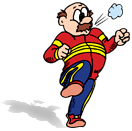|
In 1997, a study found that mild to moderate major depressive disorder (MDD) ranked second behind heart disease in terms of years of life lost due to premature death or disability. National estimates indicate that fewer than one-fourth of individuals with MDD seek treatment, and only one in 10 receive adequate treatment. A recent study was designed to test whether exercise is beneficial in treating mild to moderate MDD, and to determine the dose-response relation of exercise and reduction in depressive symptoms.
Eighty adults diagnosed with mild to moderate MDD were randomized to one of four aerobic exercise treatment groups that varied total energy expenditure (7.0 kcal/kg/week or 17.5 kcal/kg/week) and frequency (three days/week or five days/week), or to a placebo control group that participated in flexibility exercises three days a week. Outcome was determined by the score on the 17-item Hamilton Rating Scale for Depression (HRSD).
 Results: After 12 weeks, the group expending 17.5 kcal/kg/week (consistent with public health recommendations) had the lowest scores, while the placebo control group had the highest scores. The authors concluded that “Aerobic exercise in the amount recommended by consensus public health recommendations was effective in treating mild to moderate MDD. The amount of exercise that is less than half of these recommendations was not effective.” Results: After 12 weeks, the group expending 17.5 kcal/kg/week (consistent with public health recommendations) had the lowest scores, while the placebo control group had the highest scores. The authors concluded that “Aerobic exercise in the amount recommended by consensus public health recommendations was effective in treating mild to moderate MDD. The amount of exercise that is less than half of these recommendations was not effective.”
If you suffer from mild to moderate depression, try engaging in some type of physical activity. You'll experience a wide range of benefits in a short amount of time, including elevated mood, increased stamina and improved health, overall.
Reference:
Dunn AL, Trivedi MH, Kampert JB, et al. Exercise treatment for depression. Efficacy and dose response. American Journal of Preventive Medicine 2005;28(1):1-8.
For additional information on sports and fitness, go to https://www.chiroweb.com/find/tellmeabout/sports.html
|



